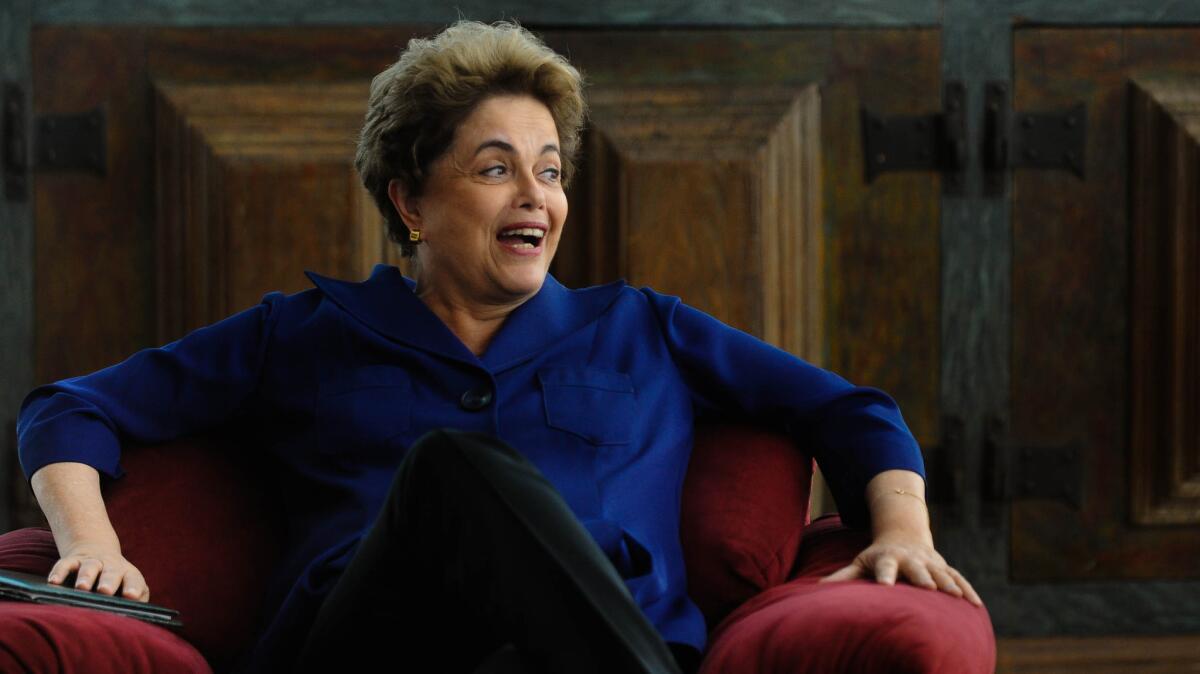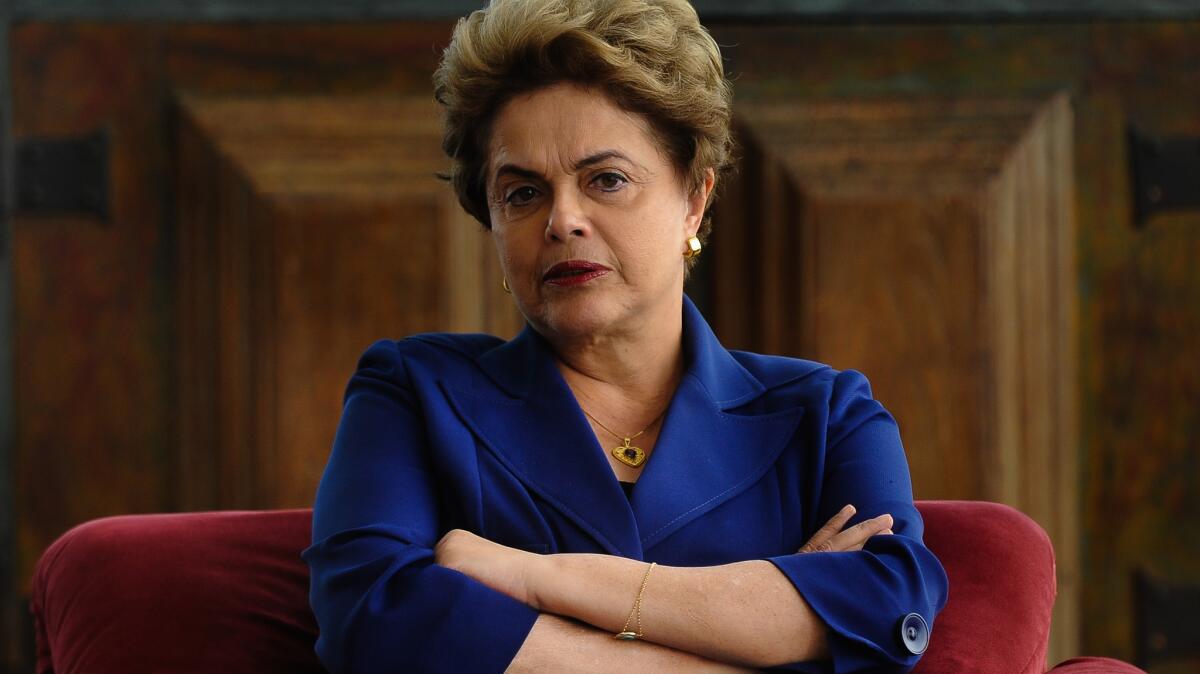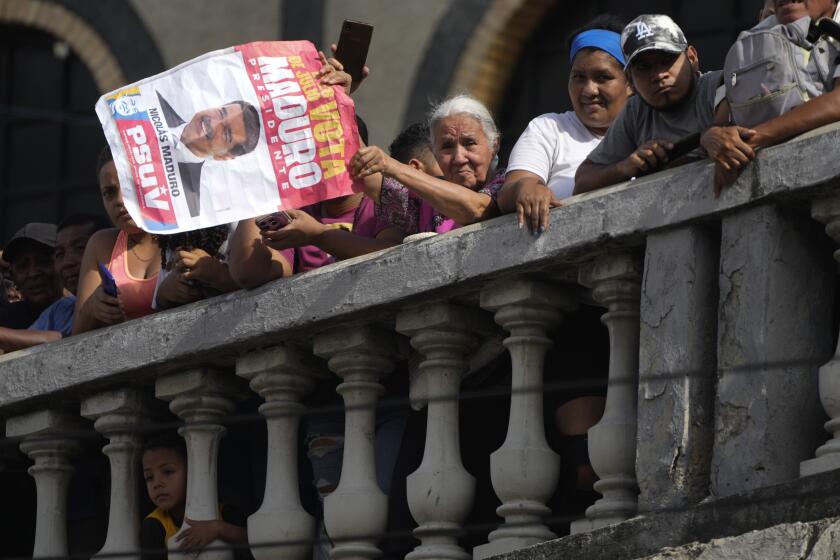Brazil is in turmoil, an impeachment trial looms, and still, Dilma Rousseff laughs

Dilma Rousseff has been suspended from the presidency of Latin America’s largest country by what she brands a coup d’etat, and she is fighting an uphill battle to save her political life. But as Brazil’s first female president talks about impeachment, relations with the United States and being abandoned by onetime allies, she laughs.
She’s sitting in an armchair in the official Alvorada Palace presidential residence, while Vice President Michel Temer is running the country across town in the capital of Brasilia, trying out a much more conservative response to Brazil’s serious economic and political crises. Her humor holds, even when discussing one of the darkest moments of her life.
She chuckles when recalling the U.S.-backed dictatorship that took power in a 1964 coup.
“We had a terrible relationship,” Rousseff says dryly. As a young left-wing guerrilla, she was tortured repeatedly by the regime.
Rousseff has been suspended from office since May, when lawmakers voted to try her on charges of shifting public funds to cover deficits. Impeachment would remove her from office and make Temer president. Her trial looms as Brazil weathers rising unemployment, a multibillion-dollar corruption scandal and fears about crime and the Zika virus, all while preparing for the Olympics, which start Aug. 5.
She gets serious and sits forward, discussing the president who invited her to Washington just last year, but whose government has been criticized in Brazil for staying silent on the country’s impeachment crisis.
“I don’t think the Obama administration endorses coup-mongering,” she says. “Many people have tried to say that the coup in Brazil has to do with U.S. intervention in some moment. I want to say that I don’t believe that. It’s a poor explanation. I believe what’s happening in Brazil is the fruit of Brazil’s internal dynamics.”

But even though she and her left-leaning Workers’ Party have been dealt a crushing blow, the laughter keeps bubbling up.
In Brazilian Portuguese, there is a saying, “Rir pra não chorar.” Laugh so you don’t cry. It describes a mechanism Brazilians developed for coping with the misfortunes that have often struck their country.
This approach was on display when Germany humiliated soccer-mad Brazil 7 to 1 in the 2014 World Cup, as Brazilian fans ended the game aggressively joking and sarcastically cheering each new German goal.
During a 90-minute conversation with the Los Angeles Times, it seems the embattled leader has adopted a similar approach, as she bursts out laughing a number of times, usually at the absurdity of her situation. She says instead that she’s simply used to a life of struggle.
“You always have to fight,” she says. “There’s never a day when you’re finally free. At least for me, there never has been so far.”
She’s gregarious today, but while in power, the 68-year-old revolutionary-turned-economist was not known for her people skills and never had an easy relationship with Brazil’s power structure. She never held office before being elected to her first term in 2010, and was unlike her predecessor, Luiz Inacio Lula da Silva, a former union leader who was a consummate deal-maker.
See the most-read stories in World News this hour >>

She was said to be committed to her own ideas about how things should be run, which caused her problems in Congress and with business leaders, who with economists now say her poorly executed interventions helped ruin the economy.
“All presidents make errors,” she says. Pointing out that Brazil has a presidential system like the United States, she adds, “I don’t agree you can remove a president for any economic error, or for what someone thinks is an economic error.”
Rousseff enjoyed high approval ratings until 2013, but after her reelection in 2014, her popularity plummeted. Temer and much of Congress — a majority of whom are accused of corruption or serious crimes — turned on her and launched the controversial impeachment process.
She scoffed at calls to resign then, but now says that if she gets back in power, she might try to hold a national plebiscite to call for new presidential elections, conceding it would be difficult. She bursts out laughing when asked if the easy solution would be to persuade Temer to resign along with her, automatically triggering the elections she now favors.
“Yep, easy!” she says between deep laughs. The un-electable leaders of a coup don’t just give up power, she says.
Rousseff and opponents of her impeachment have argued that the unpopular Temer and his congressional supporters cynically took advantage of a crushing recession and Rousseff’s unpopularity to seize power, move the country sharply to the right, and to protect themselves from criminal investigations.
Brazil’s political battles will be on display for the world to see during the Rio Olympics, throughout which Temer will still likely be acting president. He may try to use the spotlight to legitimize his rule, and his opponents may use the occasion to take to the streets and demand his removal.
Rousseff laments that the Games will take place during the political crisis.
“Because I’d really like to be able to participate, as the president who helped make the Olympics happen,” she says. Rio won the right to host in 2009, when she was serving under Lula and Brazil was still on its dramatic upswing. Brazil already had been named host of the 2014 World Cup, and the Olympics were one more big cherry on top of the ice cream, which has since slowly melted away.

When asked if, given what we know now, it might have been enough to hold just the World Cup, rather than two mega-events in two years, Rousseff cracks a smile, but stops herself before breaking into full laughter. She says the World Cup was a much more complex operation and an organizational success, and that for the Olympics, “Brazil has all the conditions in place to welcome the athletes, the tourists and the world’s leaders.”
Critics of the Workers’ Party hate when Rousseff and others say “coup” or invoke their legacy as heroic victims of the dictatorship, arguing it’s absurd to play the role of victims after they have run the country for 13 years.
She talks of the country’s “oligarchy” working together with an antagonistic “oligopolistic media” to create a political crisis and work against her, and she correctly notes that many congressmen who voted to start her impeachment face criminal corruption charges. But opponents charge hypocrisy and note that these same politicians formed Rousseff’s and Lula’s congressional base, and that Brazil’s biggest companies paid for Workers’ Party campaigns.
Even some of Rousseff’s opponents view her as a rare character in Brazilian politics — a politician who is not personally corrupt. She faces no criminal charges.
MORE: Get our best stories in your Facebook feed >>
Over the last few months, however, a federal police investigation implicated all of Brazil’s major parties and seemed to reveal that corruption is at the base of the country’s entire campaign finance system. How could she have won two presidential elections without being complicit?
“No one in Brazil had any idea how big this scheme was,” she says of the scandal. “Let me tell you why I’m an outsider. My first ever campaign was for president. In a presidential election, the candidate is not in charge of raising money. The treasurer receives the funding.” A former Workers’ Party treasurer has been sentenced to jail, and Rousseff says her campaigns received no illegal contributions.
As for her party’s compromises with traditional elites, Rousseff says Brazil needs a complete reform of its political system and says she wishes it weren’t necessary to make deals with a large number of congressional parties — usually over 25 — to run the country. And she proposes new media industry regulations that would not censor content but would discourage the concentration of ownership Brazil currently has.
But that would be in the future, in a 14th year of Workers’ Party rule that very well may never appear. Looking back, what are the major regrets?
“Oh, I can’t answer that type of question,” she says before her eyes light up and she delivers a final big laugh for the room. “What I regret most is having a vice president!”
Bevins is a special correspondent.
MORE WORLD NEWS
Islamic State shifts strategy from building territory to spreading terror worldwide
Nigel Farage, head of the UK Independence Party, resigns after ‘Brexit’ victory
No TPP trade deal? Some Japanese farmers say all the better for them
More to Read
Sign up for Essential California
The most important California stories and recommendations in your inbox every morning.
You may occasionally receive promotional content from the Los Angeles Times.






